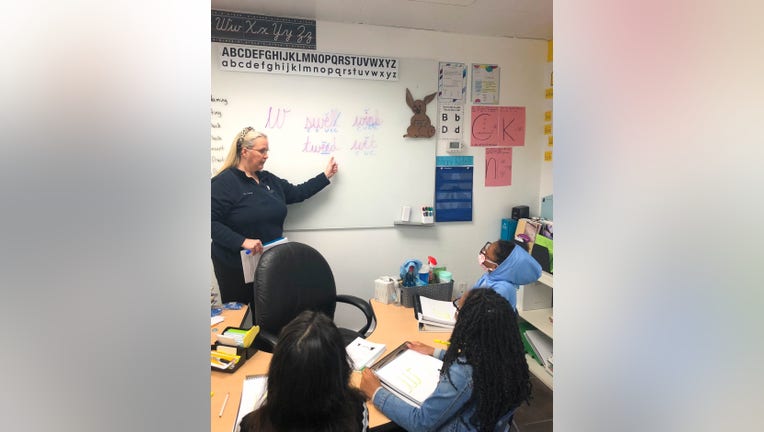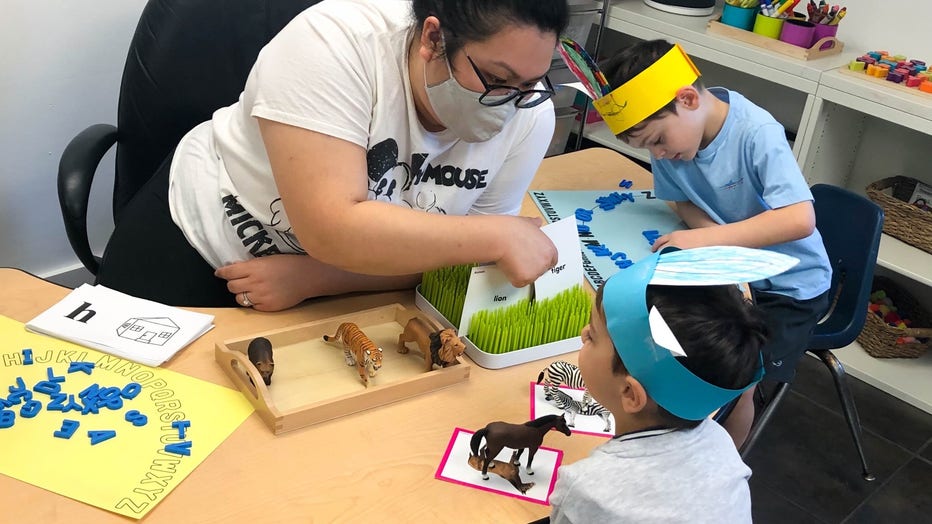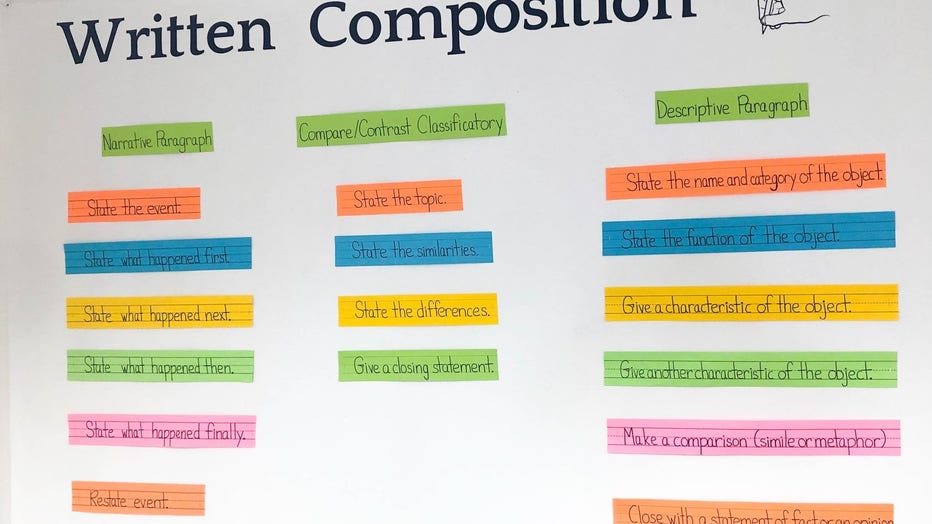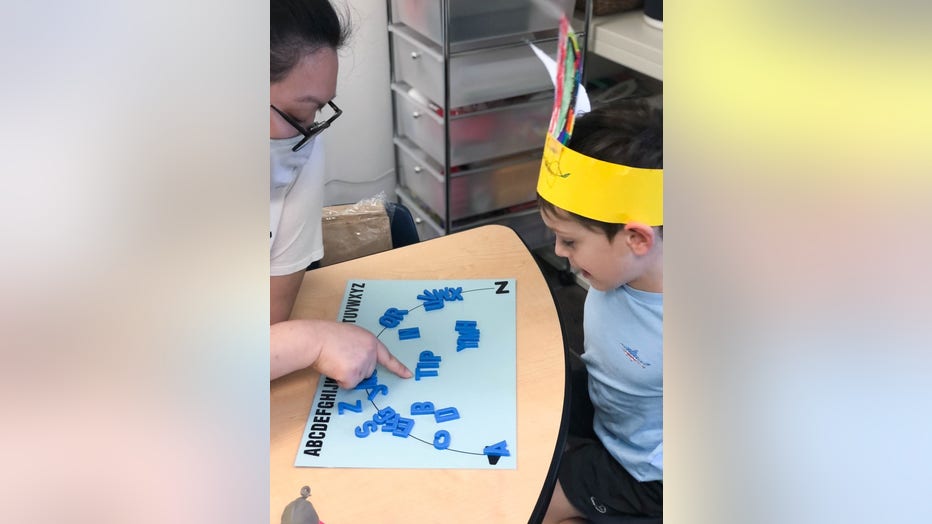Dyslexia School of Houston holds summer camp for students to make learning fun, promote 'literacy for all'

(Photo courtesy of Dyslexia School of Houston)
HOUSTON - They say education is the cornerstone of our society, and any educator will tell you students learn differently and require a little more assistance, and more time as well.
That's why Tammy Spencer, an expert in special education and the dyslexia community with more than 25 years of experience, founded the nonprofit Code Academy Dyslexia School of Houston. And even though schools have closed, the learning continues through the Dyslexia school's Summer Literacy Camp, which kicked off June 6, 2022.
The camp looks to provide personalized teaching sessions focused on reading, grammar, writing, and more. Each program includes a 6:1 student-to-teacher ratio, ensuring each child gets proper attention while preparing them for the Fall school year.

(Photo courtesy of Dyslexia School of Houston)
During an interview, Spencer explained her passion for literacy and education is what encouraged her to do so.
"I just had a huge passion for literacy, and most importantly spelling," she said. "It drives me crazy when words are misspelled, and it makes me think the scientific spelling approach that all children deserve that."

(Photo courtesy of Dyslexia School of Houston)
The program first began in 2021 and was inspired by Spencer's mission of "literacy for all," coupled with the literacy gap exacerbated by the COVID-19 pandemic.
"The pandemic actually exposed some failures of our public education," Spencer added. "And it opened up a lot of eyes to recognize that what our teachers that are working so hard, in trying to work with every child's individual needs, is now something that we're able to bring to the table and communicate with involving decision-makers."
MORE: Tackling the problem of illiteracy in children, made worse by the COVID-19 pandemic
"Our parents are coming to us, our family members are coming to us extremely emotional," she continued. "They're understanding that at a certain point, you have these expectations of literacy of letters, sound-symbol recognition, decoding abilities, putting those sounds together to make words, taking those words, reading them developing sentences, when you put words together, and putting those words together, creating the sentences, sentences, making paragraphs, they know and recognize their children are struggling. These are our most vulnerable children."

Houston Mayor shares childhood reading struggles to help promote literacy
Children who don't have books read to them are more likely to become adults who are unemployed, homeless, or incarcerated. Wednesday was Houston Reads Day. What are you doing to help? Some area leaders and athletes read to students at school.
According to the HISD Dyslexia Evaluation Report for the 2020-2021 school year, 2.4% of the student population identified as having dyslexia. This may not seem like a lot on the surface, but nationally, about 20% of the population, or one in every five people, have some form of dyslexia.
"We have to remember that most importantly, we're working and assisting children with specific needs," Spencer said. "Literacy is the direst need throughout education. Without a strong foundation, we would have our community members struggling. We don't want that. We want to make sure that they have every opportunity for a successful educational career."

(Photo courtesy of Dyslexia School of Houston)
For those who do not have dyslexia, it's hard to imagine the kind of struggles students encounter, but Spencer says the school hosts an exhibit where attendees can go through a simulation and experience it for themselves.
"We give them the opportunity to feel some of the frustrations, understanding what it means for the extra time needed, what it means to feel like the struggle - that everyday struggle that we're putting our students through," she explained. "And for those teachers that are not equipped, and specifically trained in that explicit instruction makes it difficult, just as it is for our families. ‘How can we help our babies at home?’ is what they ask us constantly."
RELATED: Bush Literacy Foundation working to fix literacy ‘crisis’ in Houston
Granted, the idea of continued learning during a summer break may seem overwhelming, but Spencer assures us the children are too busy having fun to notice they're getting an education. This is because each assignment is done at a reasonable pace and completed collaboratively.
"In the reading readiness program, for example, we work with a lot of oral language development," Spencer said. "So we have units that we've got set aside, a lot of those are based upon a Montessori approach, so very much into hands-on activities, lots of letters, lots of objects, lots of spelling, lots of handwriting, and the kids don't even realize that that's what they're being asked to do because it's too much fun when you're playing."
"And the way we believe is that we learn through our play," she continued. "Then, when we've got 45-minute rotations and each station has a designated educator that is fully trained to be able to work in that specific area of need and so when you've got the experts there, and you've got the kids that are ready to learn and eager, it doesn't seem like work; it's just a lot of fun."
The summer camp goes on until July 1, with an extension from July 5 through July 29. To learn more about the Code Academy Dyslexia School of Houston, visit their website. You can also follow them on social media.

